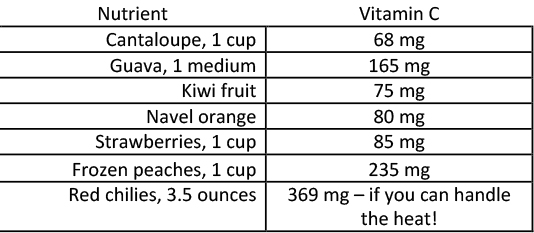There's nothing like fear to generate abnormal behavior. And in the age of COVID-19 there's plenty of fear going around (so expect a lot of it). In the past few months, we've seen that one of these odd behaviors is attributed to a significant number of health-news headlines recommending vitamin C to purportedly assist one's immune response to COVID-19. Let's take a closer look.
Many of these headlines attribute these recommendations to Dr. Fauci. The myth of vitamin C supplements assisting in immunity is nothing new, and if Dr. Fauci actually believes it, he has fallen victim to the Illusory Truth Effect.
"We encounter many misleading claims in our daily lives, some of which have the potential to affect important decisions. For example, many people purchase "toning" athletic shoes to improve their fitness or take preventative doses of vitamin C to avoid contracting a cold. How do such misconceptions enter our knowledge base and inform our choices? One key factor appears to be repetition: Repeated statements receive higher truth ratings than new statements, a phenomenon called the illusory truth effect."
"Knowledge Does Not Protect Against Illusory Truth" Journal of Experimental Psychology
In other words, most any fallacy or misconception can be made to appear to be valid if it is repeated often enough, especially if the opportunity to hear the contradictory facts are withheld. This indoctrination or propaganda has become a significant problem in much of the media's coverage of public health and environmental issues.
The following information is a synopsis of why vitamin C supplements will not benefit a reasonably fed individual's immune system. The following is taken from my book, The Myths About Nutrition Science.
There are three biological mechanisms which help to maintain nutrient homeostasis over a broad range of intakes. These are the reserve capacity of all nutrients, changes in absorption, and recycling rates of all nutrients when needs increase. This does not mean one cannot become deficient, but they should help most consumers understand that if you follow any reasonable dietary habits, you are highly unlikely to need supplements. Of course, there are exceptions, but let me illustrate my point using vitamin C as my example.
Reserve Capacity:
An average-size man can have a total body pool of vitamin C as high as 1,500–2,000mg. Consuming 60mg/day of vitamin C can attain this level, and it would take approximately 60 days to decline to 300mg with negligible intake, which is unlikely with any sensible diet. Current daily recommended levels are 90mg for men and 75mg for women in the United States, even though the benefits of 90 mg are unproven.
The Australian National Health and Medical Research Council reviewed the same data to arrive at their Nutrient Reference Values for Australia and New Zealand men and women and set its recommendations at 45mg/day for both groups. The British Nutrition Foundation established 40mg/day for both men and women, as did Public Health England, all considerably lower than the US values. However, the point is not which country's recommendations is correct, but that either 40mg or 90mg per day will maintain a substantial reserve of vitamin C, and how easy it is to obtain through food and why any recommendation to consume large doses as a supplement is fruitless.
Following is a list of common foods and their vitamin C content as taken from Bowes and Church's Food Values of Portions Commonly Used, 14th edition:

"no signs of ascorbic acid deficiency have been shown at this pool size (900mg), and that higher body reserves have not been shown to provide increased health benefit."
Robert Jacobs, Ph.D., FACN, [1]
Changes in Absorption Rates:
Most of the digestion and absorption of food and its nutrients into the bloodstream occurs in the small intestines. Researchers [2] determined the unique projections and folding's of the villi and microvilli, which line the small intestines absorptive surface area, "amplify the small intestinal surface area by 60–120 times," illustrating the highly complex and efficient capacity of the small intestines to regulate the absorption of nutrients by several-fold. Absorption can vary dramatically, depending upon need, availability, and negative interactions with other nutrients taken in excess, which may impede a nutrient's absorption. Vitamin C is readily absorbed, and it is widely available in food.
Changes in Excretion Rates:
Many people believe that nutrients are used up, and then what is left is quickly excreted or catabolized. This is a myth. Specifically, nutrient excretion rates through the kidneys readily change from rapid (when intakes are excessive) to very low (when intake is low or needs increase). Reabsorption rates by the kidneys can play a significant role in maintaining nutrient balance over a wide range of dietary intakes. For example, when the intake of vitamin C is less than 100mg, no ascorbate is excreted in the urine. At 100mg, about a quarter of the dose is excreted, and at 200mg, the figure rises to half. By contrast, for amounts greater than or equal to 500mg, all the absorbed dose is excreted in the urine. At higher doses, virtually all the absorbed dose was excreted.
Thus, despite an individual's, or Dr. Fauci's best intentions to supplement vitamin C intake to assist immunity, the body naturally excretes what it does not need, resulting in a waste of money. Additionally, Vitamin C content of neutrophils, monocytes, and lymphocytes [your white blood cells for fighting infections] become saturated at a 100mg dose, so is it even wise to consume such large supplemental quantities of vitamin C?
[1] Dr. Jacobs is a past research chemist with the USDA Western Human Nutrition Research Center at UC Davis, author of the vitamin C chapter in the college text Modern Nutrition in Health and Disease 8th edition, and a past panel member for the development of the RDA's.
[2] Surface Area of the Digestive Tract—Revisited Scandinavian Journal of Gastroenterology DOI: 10.3109/00365521.2014.898326

